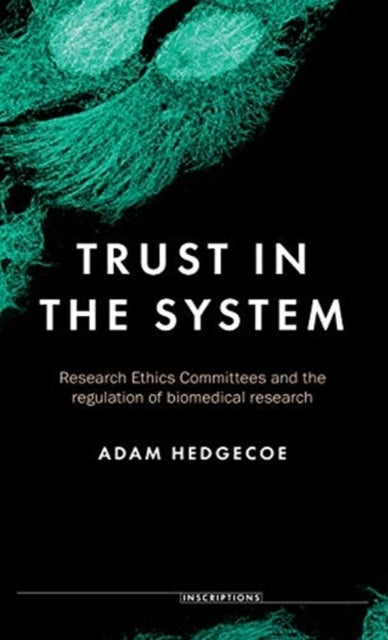Adam Hedgecoe
Trust in the System: Research Ethics Committees and the Regulation of Biomedical Research
Trust in the System: Research Ethics Committees and the Regulation of Biomedical Research
YOU SAVE £9.14
- Condition: Brand new
- UK Delivery times: Usually arrives within 2 - 3 working days
- UK Shipping: Fee starts at £2.39. Subject to product weight & dimension
Bulk ordering. Want 15 or more copies? Get a personalised quote and bigger discounts. Learn more about bulk orders.
Couldn't load pickup availability
- More about Trust in the System: Research Ethics Committees and the Regulation of Biomedical Research
Research Ethics Committees (RECs) are groups of people from all over the UK that decide what kind of research should be carried out on patients within the NHS. This book provides an in-depth insight into RECs, challenging the impersonal, de-socialized, and mechanical models of REC decision-making.
\n Format: Hardback
\n Length: 224 pages
\n Publication date: 10 December 2020
\n Publisher: Manchester University Press
\n
Every month, groups of people from all over the United Kingdom come together to decide the kind of research that should be carried out on patients within the National Health Service (NHS). These groups, known as Research Ethics Committees (RECs), are comprised of doctors, nurses, researchers, and members of the general public. Their role is crucial in shaping the future of medicine and playing a vital role in regulating a wide range of research, from social science to epidemiology, vaccine and drug trials to surgery.
In order to provide an in-depth insight into RECs, one of the most crucial forms of regulation around medical research, this book has been based on extensive observations, interviews, and archival research. It challenges the impersonal, de-socialized, and mechanical models of REC decision-making, offering one of the first empirical examinations of this kind of regulation.
The book begins by exploring the historical background and development of RECs in the UK. It discusses the establishment of the National Research Ethics Service (NRES) in 1974, which was responsible for setting up and regulating RECs across the country. The book then goes on to examine the composition and functions of RECs, including their role in ensuring the ethical conduct of research, protecting the rights and welfare of research participants, and promoting the benefits of research to society.
One of the key themes of the book is the role of RECs in ensuring the ethical conduct of research. It discusses the ethical principles that guide REC decision-making, such as respect for human dignity, beneficence, non-maleficence, and justice. The book also explores the challenges that RECs face in ensuring the ethical conduct of research, such as balancing the interests of researchers, participants, and the public, and navigating complex ethical dilemmas.
Another important theme of the book is the role of RECs in protecting the rights and welfare of research participants. It discusses the procedures that RECs follow to ensure that research participants are fully informed about the risks and benefits of participating in research, and that their rights are protected throughout the research process. The book also explores the role of RECs in monitoring the conduct of research and investigating any ethical concerns that may arise.
The book also highlights the importance of RECs in promoting the benefits of research to society. It discusses the ways in which RECs can contribute to the development of new treatments, therapies, and interventions that can improve the health and well-being of individuals and communities. The book also explores the role of RECs in engaging with the public and stakeholders to ensure that research is conducted in a transparent and accountable manner.
In conclusion, this book provides an in-depth insight into RECs, one of the most crucial forms of regulation around medical research. It challenges the impersonal, de-socialized, and mechanical models of REC decision-making and offers a comprehensive examination of the composition, functions, and challenges of RECs. The book is essential reading for anyone interested in medical research, ethics, and the regulation of research.
\n Weight: 428g\n
Dimension: 146 x 223 x 23 (mm)\n
ISBN-13: 9781526152916\n \n
This item can be found in:
UK and International shipping information
UK and International shipping information
UK Delivery and returns information:
- Delivery within 2 - 3 days when ordering in the UK.
- Shipping fee for UK customers from £2.39. Fully tracked shipping service available.
- Returns policy: Return within 30 days of receipt for full refund.
International deliveries:
Shulph Ink now ships to Australia, Belgium, Canada, France, Germany, Ireland, Italy, India, Luxembourg Saudi Arabia, Singapore, Spain, Netherlands, New Zealand, United Arab Emirates, United States of America.
- Delivery times: within 5 - 10 days for international orders.
- Shipping fee: charges vary for overseas orders. Only tracked services are available for most international orders. Some countries have untracked shipping options.
- Customs charges: If ordering to addresses outside the United Kingdom, you may or may not incur additional customs and duties fees during local delivery.


